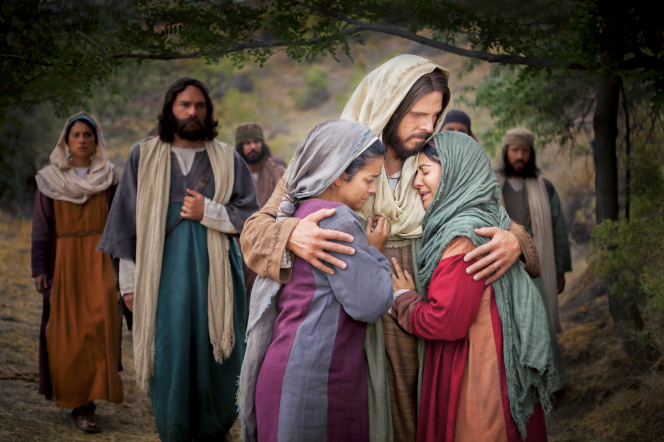
As you may know, I tried to finish the Book of Mormon before the end of 2011 and it didn’t happen, and so now I am trying to finish it by the end of the week. (as of Wednesday I have about 80 pages to go!)
My husband told me that I will probably have to do a less thorough reading to get through it in that time, but I was sure I would be able to get through it quickly while still studying and gleaning.
Then I hit 3 Nephi 20. You think 2 Nephi is hard, try reading 3 Nephi 20. I kept reading, even though I didn’t really understand what the Savior was talking about, and about a page and a half into chapter 20 I decided that I really needed to understand what was going on here.
I went back to verse 10, when the Savior starts talking about the remnant of Israel. I read it over and over again and I still couldn’t figure it out. I was a little unnerved that I couldn’t understand this passage, and so I finally prayed for Heavenly Father to open my mind and my hearts (“and their hearts were open and they did understand in their hearts the words which [Christ] prayed” – 3 Nephi 19:33).
And then I went back and read it again.
“Behold now I finish the commandment which the Father hath commanded me concerning this people, who are a remnant of the house of Israel.”
Great. I’ve got this – the Nephites are a remnant of the house of Israel, and Christ had to come to the Nephites, because that was part of God’s plan. That’s all stuff I knew from seminary.
“Ye remember that I spake unto you, and said that when the words of Isaiah should be fulfilled – behold they are written, ye have them before you, therefore search them – And verily, verily, I say unto you, that when they shall be fulfilled then is the fulfilling of the covenant which the Father hath made unto his people, O house of Israel.”
I had to stop here for a second and ask myself, “What words of Isaiah is the Savior talking about? Obviously not all of them, since there are some words that haven’t been fulfilled yet. And what covenant is He talking about?” The covenant God made with Israel was that Christ would come to them, and that He would gather His people. Also, that when Christ would come, the Mosaic law (which was part of the original covenant with Israel) would be fulfilled.
“And then shall the remnants, which shall be scattered abroad upon the face of the earth, be gathered in from the east and from the west, and from the south and from the north; and they shall be brought to the knowledge of the Lord their God, who hath redeemed them.”
The first line of this verse caught me off guard for a minute - “the remnants, which shall be scattered” – but I thought the House of Israel had already been scattered? And then I realized that he was talking about scattering the remnants of the House of Israel – the Nephites/Lamanites. We can see the “scattering” of the Nephites and Lamanites all over the American continents today.
Then the Savior must be talking about more of the words of Isaiah than just the Messianic prophecies. And the covenant He is talking about here must be the covenant to gather Israel.
Much clearer now (Note to self: praying before reading complex scripture passages is a great idea)
“And the Father hath commanded me that I should give unto you this land, for your inheritance.”
Also a well-known fact – America is the “promised land”.
“And I say unto you, that if the Gentiles do not repent after the blessing which they shall receive, after they have scattered my people –”
Here I am pretty sure the Savior is getting ready to talk about what will happen if the Gentiles don’t accept the gospel after they scatter the Nephites and the Lamanites and are given the promised land – remember, the Gentiles were given America as well to restore the gospel, because of the wickedness and eventual apostasy of the Nephites.
“Then shall ye, who are a remnant of the house of Jacob, go forth among them; and ye shall be in the midst of them who shall be many; and ye shall be among them as a lion among the beasts of the forest, and as a young lion among the flocks of sheep, who, if he goeth through both treadeth down and teareth in pieces, and none can deliver. Thy hand shall be lifted up upon thing adversaries, and all thine enemies shall be cut off.”
This is where I got stuck again. My first thought was that if the Gentiles reject the gospel, the Lord will allow the remnant of the Lamanites (the native people of the Americas) to destroy the Gentiles. *(see note at bottom of post)
 (Image Source: Animal Planet)
(Image Source: Animal Planet)
Because I don’t like to speculate, I pulled out my old Book of Mormon seminary manual to see if there was anything in there. Nope. Just the “gathering of Israel” part. I even checked out this commentary video on BYUtv about it, but they did the same thing – talked about how important the words of Isaiah are, and about the gathering of Israel.
No one seemed to mention these verses, so I headed to Google (which I only use as a last resort when it comes to gospel study – I don’t like to find a bunch of stuff written by crazy people…)
I came across this blog, Feast Upon the Word, and discovered a series of posts discussing just this topic! The author is … very educated, it seems, and the posts are not for the faint at heart (I had to move to my desktop computer to read them, instead of my phone – it was really that intense – and I had to actually look up a few words he used online. And I consider myself pretty well educated with a decent size vocabulary).
I have a feeling that in order to really understand this part of 3 Nephi I am going to have to dedicate some time to studying Isaiah 52 and Micah 4-5, so I probably will just “skim” through these chapters and pick out what I can for now while I am trying to finish the Book of Mormon.
I am excited to study these passages in more depth, and hope to do so in the next few weeks!
*Turns out this passage is simply talking about the power of the House of Israel during the gathering of Israel to teach the gospel to the Gentiles and purify them. The Gentiles who won’t accept the gospel will be cut off from Heavenly Father.
Have you ever been absolutely stumped by a passage of scripture? Have you prayed to be able to understand the scriptures better? Where do you look for help understanding passages that stump you? Do you have thoughts on these passages in 3 Nephi?







